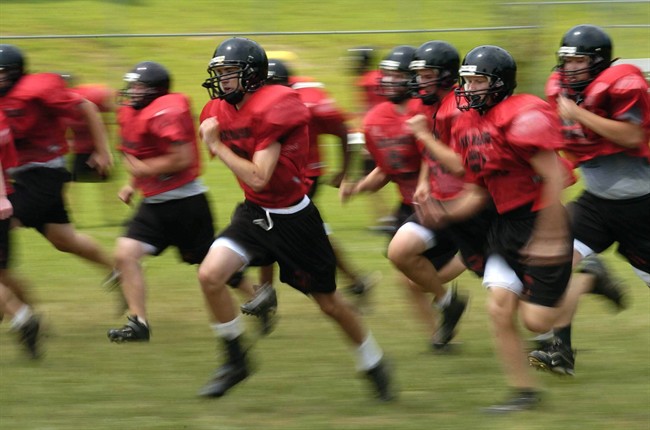Concussion research spreads far and wide, but it’s still unclear how long children should rest for a safe recovery. New research suggests that five days of bed rest could do more harm than good, turning age-old advice on its head.

Scientists at the Children’s Hospital of Wisconsin say that lengthier rest periods could lead to a slower recovery and more symptoms in kids dealing with concussion. Their findings contradict several recommendations that call for days of bed rest and even the “cocoon therapy” that would have kids recover in complete darkness to rest their brains.
READ MORE: Canadian docs release 1st national guidelines on concussion in kids
“This is the most controversial topic in concussion management right now. We know you need rest but the question is how much?” says Dr. Roger Zemek, an emergency medicine specialist at the Children’s Hospital of Eastern Ontario (CHEO). He’s also the lead author of Canada’s first concussion treatment guidelines.
He calls the how-much-rest quandary a “Goldilocks scenario” – too hot, too cold, just right – the correct answer varies, and hinges on so many factors.
Global News looks at the study findings and the verdict from Canadian experts.
The study’s findings:
The Milwaukee doctors assigned their concussion patients to either five days of strict rest or only two days of strict rest. After that, both groups returned to daily activities, such as school, homework, and physical activity, gradually in a step-by-step process.
Kids are usually told to avoid returning to sports and physical activity, but some doctors advise against loud music, movies, video games or even reading. In interviews with Global News, concussion experts described this recovery period as “recharging the batteries.”
READ MORE: Panel finds helmets, mouth guards don’t prevent concussions
Turns out, the U.S. doctors found that kids with longer rest periods didn’t fare any better. Their thinking, balance and symptoms weren’t improved compared to those who only rested for two days. In some cases, their symptoms were worse.
Stress induced from missing school, social interactions and falling behind in class may play a part in triggering physical and emotional symptoms, the researchers suggested. Read the full study here.
Sound bite: “Contrary to expectations, strict rest for five days immediately after concussion did not help teenagers get better compared to our current advice of one to two days of rest followed by a gradual return to activity,” lead author, Dr. Danny Thomas, told Reuters Health.
“We should be cautious when imposing excessive restrictions of activity following concussion and mindful when the discharge instructions we provide patients may influence their perception of illness,” he said.
The counter argument: To be clear, experts applauded the study’s design, but made some points that parents, coaches and readers should be aware of.
The research isn’t providing a blanket statement for all concussion patients. For starters, the study is small, with only 88 patients (between 11 and 22 years old).
READ MORE: Even without concussion, head injuries still affect learning, memory, study warns
None of the patients were admitted to hospital for their injuries so these results don’t factor in severe injury that requires hospitalizations. Instead, this group turned up in the emergency department, were examined and sent home with advice to rest for either 48 hours or more than 48 hours.
Other experts noted that the participants were only studied for about 10 days – Zemek notes that in 30 per cent of kids, concussion symptoms can linger into the 28-day mark.
READ MORE: Mood swings, memory loss first symptoms of brain disease in hockey, football players
The study wasn’t a blind experiment either. In blind experiments, patients don’t know if they’re receiving treatment or placebo, thereby removing the potential for influencing their outcomes.
Sound bite: “Those assigned to the strict rest group may have perceived themselves as sicker,” Dr. William Meehan, the director of the Micheli Center for Sports Injury Prevention, wrote in an accompanying commentary.
Canadian experts weigh in:
Zemek led a team of about 30 experts from across Canada and the United States to launch the country’s first guidelines on diagnosing and treating concussion.
Right now, he’s in the midst of studying the health records of nearly 3,000 concussion patients across nine Canadian centres in hopes of piecing together who is more vulnerable to severe symptoms and may, in turn, need closer medical attention.
The U.S. study should trigger more research into rest periods, Zemek said.
READ MORE: Pull athletes showing signs of concussion, updated guidelines warn
“I don’t think we need to drastically change our behaviour based on this study but what it does is better highlight the need to answer this question,” he told Global News.
He agrees with the findings, for the most part: some recommendations are against even taking a 15-minute walk if your child has a headache, for example. That limits access to fresh air, he warns.
In piecing together his guidelines, Zemek and his team erred on the side of caution providing two sets of recommendations and leaving the decision in the hands of clinicians treating patients.
“There’s no evidence to say one is better than the other,” he told Global News.
The bottom line for concerned parents and coaches? These results are in no way saying that you can send your kids off to a hockey tournament just days after a concussion.
“It’s not saying it’s okay to go back to contact sports. This is saying it doesn’t appear that spending time in bed for five straight days helps at all with your recovery as opposed to getting back to life sooner but in a stepwise fashion,” Zemek said.
Read the full Canadian guidelines here.
carmen.chai@globalnews.ca
Follow @Carmen_Chai




Comments